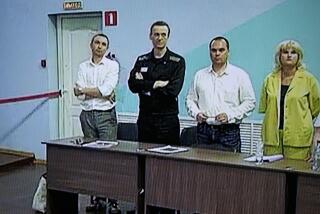Chokeholds in Central Asia
- Share via
The Central Asian republics that once were part of the Soviet Union keep marching backward politically, jailing opposition leaders or forcing them into exile, guarding against independent media that, no matter how irritating they are to the powerful, are a bulwark of democracy and a voice for those ruled.
The latest blast of bad news came this month from Kazakhstan. The government sentenced opposition leader Mukhtar Ablyazov to six years in jail, claiming he abused his power and conducted “illegal entrepreneurial activity” as energy minister from 1997 through 1999. Don’t believe it.
For the record:
12:00 a.m. Aug. 7, 2002 For The Record
Los Angeles Times Wednesday August 07, 2002 Home Edition California Part B Page 10 Editorial Pages Desk 0 inches; 23 words Type of Material: Correction
Central Asia--A Friday editorial incorrectly identified the capital of Kazakhstan. The capital was moved from Almaty to Astana in 1997.
Ablyazov’s conduct as minister did not trouble Kazakhstan President Nursultan A. Nazarbayev a bit until November. That’s when Ablyazov announced the formation of a new political movement calling for greater democracy and business freedom.
The ruling regime arrested Ablyazov in March, shortly before jailing another leader of his Democratic Choice for Kazakhstan party, Galymzhan Zhakiyanov, a former regional governor now facing similar abuse-of-power charges.
Nazarbayev is one of a number of autocratic rulers hoping to leverage his support for the U.S. war against terrorism, so the U.S. will turn a blind eye as the clamps on potential political opponents are tightened. Kazakhstan recently signed an agreement allowing U.S. military aircraft to land at the airport in Almaty, the capital, in an emergency.
In Uzbekistan, Kazakhstan’s next-door neighbor, a Western diplomat said U.S. envoys repeatedly had told President Islam Karimov that he must loosen the reins of repression. Karimov, like Nazarbayev, was perfectly happy running his fiefdom as part of the Soviet Union. When the Communist nation collapsed a decade ago, both men kept their firm grip on power. The United States is trying to foster a climate for independent media in both Uzbekistan and Kazakhstan, a difficult but necessary task.
In Almaty, the editor of a newspaper whose stories angered Nazarbayev supporters was threatened and her offices were firebombed. Rather than look for the real arsonists, police said they would charge the paper’s publisher with the crime. Last week, the company that published the newspaper was ordered to close. The company’s lawyer called the ruling “a political decision.”
The last decade has seen encouraging increases in political freedom in large areas of East Asia and Latin America. In Central Asia, Afghanistan is trying to rebuild a shattered nation, erecting new buildings and new democratic institutions.
Such neighbors as Uzbekistan and Kazakhstan have far more natural resources than Afghanistan, plus roads, schools and government agencies for everything from agriculture to telecommunications. What they need is political openness. The United States and its allies should push the autocratic rulers in that direction.
More to Read
Sign up for Essential California
The most important California stories and recommendations in your inbox every morning.
You may occasionally receive promotional content from the Los Angeles Times.













